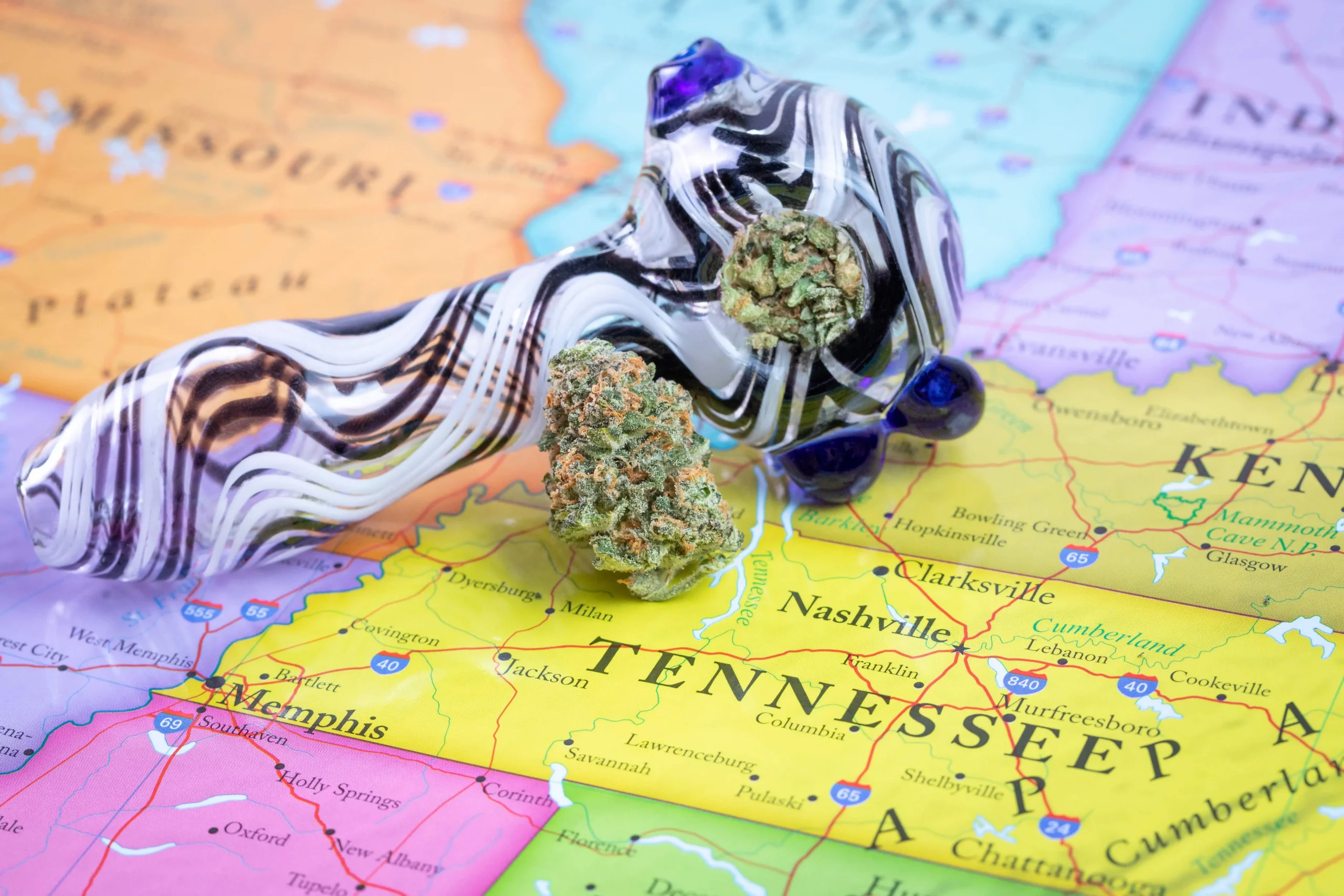
Marijuana is currently illegal in Tennessee for both medical and recreational uses, including cultivation and possession. However, CBD products that contain ≤0.3% THC are presently allowed for individuals who suffer from seizures.
What Are the Laws for Medical and Recreational Marijuana?
Currently, any amount of marijuana possession is treated as a misdemeanor with ≤12 months of prison time and a fine of ≤$2,500. Cultivation can lead to even steeper sentences, with between one and six years in prison. Each additional plant being grown makes the penalties harsher.
Up until 2016, any third-time possession charges were treated as felonies — the legislature downgraded third and subsequent convictions to misdemeanors.
Though efforts are currently underway to get Tennessee to decriminalize marijuana, decriminalization has not found a home here. Ordinances passed in 2016 that gave officers the right to charge someone with a civil infraction for cannabis possession were overturned shortly after being passed.
Fortunately, in October 2022, President Biden granted a federal pardon for all simple marijuana possession charges. This is progress, even though it has not changed Tennessee’s state laws.
How Much Can You Have on You?
Unfortunately, there is no stated minimum to the amount of marijuana you can carry in Tennessee. Possession of anything up to a half-ounce can lead to up to a year of jail time.
The State of Tennessee’s Cannabis Reform Prospects
At the time of writing, Tennessee is one of just 13 states that do not have a medical cannabis program and is one of 19 states that puts people in prison for possessing small amounts of marijuana.
In 2022, the legislature was not able to push any type of cannabis policy reform through the state congress, despite the majority of Tennessee voters supporting reform. In particular, 81% of Tennesseans are in favor of allowing doctors and patients to make their own decisions on using medical cannabis.
In fact, 2022 saw several bills introduced to Congress that would have legalized medical cannabis and legalized and decriminalized recreational cannabis. None made it past committee hearings.
2021’s Approval of SB 118
In 2021, SB 188 passed the legislature to create the Tennessee Medical Cannabis Commission, an organization that studies medical cannabis. This bill expanded on the state’s CBD law by broadening it to conditions beyond epilepsy and by raising the THC limit to 0.9%. This protects anyone enrolled in the program from prosecution. All products have to be purchased at state-licensed dispensaries in states with reciprocity provisions (which allow cannabis products to be transported to Tennessee).
In January 2022, the legislature received a recommendation from the Tennessee Medical Cannabis Commission to improve the high-CBD/low-THC program. The committee recommended that the state include vapors, edibles, patches, oils, and tinctures in its approved cannabis forms, but not dried flower.
The committee failed to act on any of its recommendations.
Racial Disparity in Cannabis Enforcement
s is the trend in other places like NYC, cannabis enforcement appears to target blacks more than whites. In 2018, the ACLU released a report stating that blacks were more than three times more likely to be arrested for cannabis than whites, despite similar use rates.
Legalization cannot completely eradicate disparities, but it certainly can lower the number of cannabis arrests. Proof of concept lies in the fact that five out of the seven states with the best records on disparity have legalization laws in effect.
Tennessee’s Cannabis Policy Reform Through the Decades
In 1981, Tennessee passed HB 314, which formed a therapeutic research program that investigated the use of cannabis to alleviate suffering due to radiology, glaucoma, and chemotherapy. This law lasted until it was repealed in 1992.
In 2015, then-governor Bill Haslam officially made SB 280 law. This law allowed cannabis use for treating several carefully considered conditions like epilepsy. Unfortunately, since no legal sale was permitted in the state, residents would have to travel out of Tennessee to obtain marijuana.
In 2016, Tennessee passed HB 2144 in May 2016, which upped the legal THC limit of CBD oil to 0.9%.
In 2017, HB 1164 modified the state’s industrial hemp law to allow hemp with ≤0.3% THC to be allowed. Hemp growers must be state-licensed to grow.






